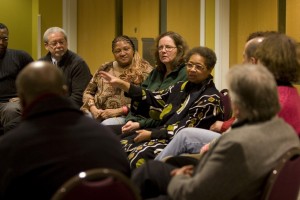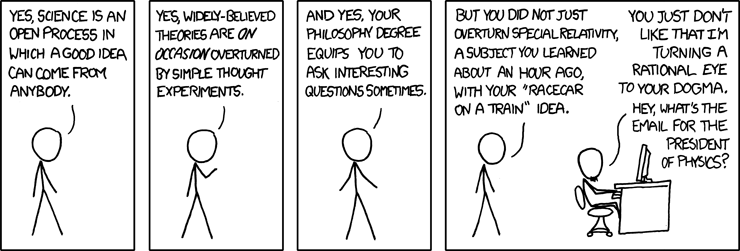 Yesterday, a bunch of atheists tried to talk about the future of atheist communities on Twitter. It didn’t go so well, and though I think the overlapping, abbreviated medium didn’t do us any favors, I was still able to suss out some points of contention I’d like to address.
Yesterday, a bunch of atheists tried to talk about the future of atheist communities on Twitter. It didn’t go so well, and though I think the overlapping, abbreviated medium didn’t do us any favors, I was still able to suss out some points of contention I’d like to address.
Greg Epstein, the Humanist Chaplain at Harvard got some coverage for hosting weekly gatherings of atheists that are meant to supply some of the community resources we miss out on by not being part of a church. Atheist provocateur PZ Myers took umbrage at atheist aping religious institutions, Hemant Mehta shared his own positive experience attending one of these gatherings, and then the Twitter ruckus began.
A Group’s Goal Should Inform its Structure
Everyone seemed to spend most of their time arguing about what kind of leadership structure (if any) atheist communities should have. Although that can be an interesting philosophical question in the abstract (see next two points), it’s kinda putting the cart before the horse. It makes more sense to try and figure out what we want these atheist communities to accomplish and then decide what kind of authority structure will work best for that goal. An activist group should probably be organized differently from an informal social hangout or a more intense support group.
It’s a lot easier to have this discussion if we stay grounded. People who object to atheist groups taking inspiration from religious communities should be able to support their criticism by explaining how a particular element interferes with the group’s goal. Since we aren’t there yet, let me respond to two broad objections.
There is such a thing as legitimate authority
For a little while in the discussion, it wasn’t clear whether PZ and others objected to the use of the word ‘chaplain’ for atheist leaders (which strikes me as weird, too) or to the idea of having people in these authoritative positions by any name. A string of tweets by Myers suggested he was put off by the structure as much as the name. He wrote:
No chaplains, unless the goal is to turn every single freakin’ member into a chaplain. #humanistcommunity
Denying the mantle of authority does not mean denying the importance of training and leadership. #humanistcommunity
One of the great things about the #atheistcommunity is the diversity. Don’t kill it in the #humanistcommunity
A progressive community should be egalitarian. We are not sheep to be led. Leave that for Xians. #humanistcommunity
An egalitarian community can still have people specialize and take on leadership roles. Anarchy is not the only way to respect the members of an organization and let them contribute. And I’m sure PZ doesn’t really see a church-y/anarchy dichotomy, since he supports various groups with leadership structures.
The sticking point doesn’t seem to be the existence of leaders as much as it the kind of respect those leaders are given. PZ wrote:
Just don’t turn it into church. Don’t develop a structure. Don’t have it led by chaplains. I’ve heard Epstein speak; a lot of what he talks about seems to be fond recollections of the way familiar old churches and synagogues were run, and I’m seeing that echoing in the way he’s setting up this “chaplain” nonsense. It’s un-egalitarian, it’s non-secular, it implies a special knowledge possessed by a Head Bozo.
So, let me talk about trust and authority for a second. There are plenty of times when I do accord special weight to the opinions of a Head Bozo on the basis of their special knowledge. The most recent example I can think of is the case of the allegedly FTL neutrinos. I trusted the scientific consensus that the initial empirical result must be flawed.
Now, for all my scientific dabbling, I definitely don’t have the expertise to come to an independent judgment of the physics in question. My expectation that Einstein was right is conditioned on my respect for the scientists making that claim (and reinforced by my total lack of respect for most science news writing). The scientists who specialize get the benefit of the doubt. Even if I think I have a case for disagreement, I remember that most people who thought they were overturning the scientific consensus were wrong. While I try to test my theory, I should still condition my behavior on the scientific consensus being right.
And that starts to sound a whole lot like submitting my judgment to a higher authority, just like PZ fears. How different am I from the Catholic who can’t personally see anything wrong with gay relationships but votes for Prop 8 because they trust their judgment of their bishop over their own experience with gay friends?
In both the scientific and religious context, I can’t personally at present verify the claims of the authority that’s earned my trust. However, in the scientific example, I am potentially able to test their claims if I threw myself into a study theoretical physics. I haven’t made that choice, but the people who have leveled up in this way tend to agree with the physicists. I can treat them as proxies for my own judgment, had I followed their course of studied, and reasonably guess that I would have come to the same conclusion.
Of course the Catholics or members of any other religion can make the same claim with respect to their theologians, so I have to go further to show that my trust is more rational than theirs. I am dubious about religious authority for some of the same reasons I don’t put much trust in philosophy professors. I’m afraid their propositions are ungrounded. No one expects their beliefs to pay rent, so it’s a heckuva lot harder to create error checking on an institutional level.
So, for the tl;dr crowd: It can be completely rational to create structures of authority and even to let your Grand Panjandrum trump your own judgment. Just condition your submission on the trust they’ve earned and make sure their claims have real-world implications that serve as fact-checking, so you can update your assessment of their authority.
Whew, this got long, and I didn’t get to address the other strand of debate: the appropriateness of ritual in secular communities. So that’s up next













